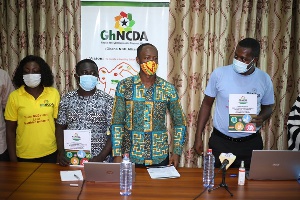The Ghana Non-Communicable Diseases Alliance (GhNCDA) has called on the government to come up with innovative financing mechanisms to protect people living with NCDS from catastrophic health expenditure within the context of the Universal Health Coverage in Ghana.
It urged for the expansion of the National Health Insurance package to include NCDs medicines, create specialize clinics for NCDs and chronic illness to avoid long waiting hours, while public education and awareness are created at the community level to reduce the impact of the diseases.
The GhNCDA made the call at the launch of a Situational Analysis Report on the status of Non-Communicable Diseases (NCDs) within the context of the Universal Health Coverage (UHC) in Ghana.
The survey was undertaken by Dr. Isaac Yeboah and Dr. Martin Wiredu, both health consultants with support from the GhNCDA.
Dr. Wiredu said the findings showed that people living with NCDs (PLWNCDs) experienced financial hardship due to the high cost of drugs and treatment thus leading to poor access to health while many of the patients faced stigmatization and discrimination, which constituted psychological barriers to seeking and receiving appropriate treatment for their conditions.
Dr. Yeboah said the PLWNCDs were of the view that their issues have been left aside for too long and that the current UHC roadmap in Ghana has been generic and therefore recommended that special attention should be given to them by allocating funds in the national budget for their financial protection.
Labram Musah, National Coordinator of the GhNCDA giving an overview and the background of the study said NCDs were the major causes of death and disability worldwide and account for about 71 percent of all deaths globally.
He said over 80 percent of the deaths occurred in low-income and middle-income countries and the rising burden of the diseases were attributed to poor dietary patterns, physical inactivity, excessive use of tobacco and alcohol.
Mr. Musah said this was compounded by the fact that PLWNCDs in low-income and middle-income countries experienced difficulties in accessing healthcare due to a lack of social health insurance policies or policies to promote UHC.
“In view of this, many of these people pay out-of-pocket; this consequently creates huge catastrophic health expenditure due to inadequate social health insurance policies to promote the attainment of UHC,” he said.
UHC refers to a healthcare system where people have uninhibited access to promotive, preventive, curative, rehabilitative, and palliative health services, which are of sufficient quality, are effective, responsive to the needs of people, while also ensuring that the use of these services does not expose the user to financial hardship.
The National Coordinator said in Ghana evidence showed that many PLWNCDs experienced poor access to quality healthcare, face both financial and geographical barriers to healthcare services and most of the services are less responsive to their health needs.
“This is further underscored by the Ghana Advocacy Agenda of PLWNCDs, outlining some of these challenges and pressing on policymakers to take action. In light of this, it remains unknown the extent to which the current NCDs burden as experienced by PLWNCDS is placed within the Ghana UHC Roadmap and the current context of the global health goal of achieving UHC by 2030.
Ebenezer Ad-Adams, the Chairman of the GhNCDA, entreated Ghanaians to support in educating community members on the factors that contribute to NCDs such as; excessive alcohol intake, smoking of tobacco and shisha, and unhealthy eating habits.
He said this would go a long way to minimize the impact of the diseases in the country.
Health News of Tuesday, 17 November 2020
Source: GNA













